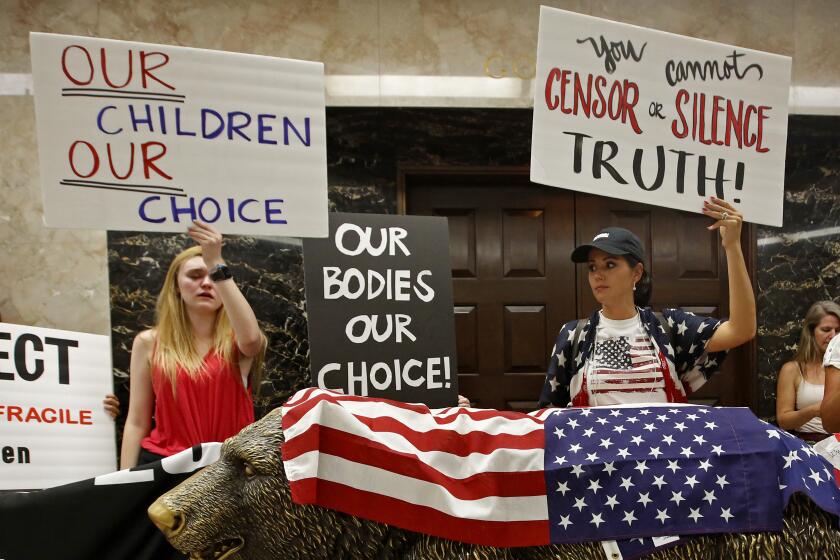Albert M. Kligman dies at 93; dermatologist developed acne, wrinkle treatments and experimented on prisoners
- Share via
Dr. Albert M. Kligman, a dermatologist who developed the acne drug Retin-A and the antiwrinkle cream Renova but who may be remembered primarily for a series of experiments on prisoners that led to major reforms in the U.S. medical testing establishment, died Feb. 9 at Pennsylvania Hospital in Philadelphia. He was 93.
FOR THE RECORD:
Albert Kligman obituary: The obituary in the Feb. 24 LATExtra section on dermatologist Albert Kligman referred to Holmesburg as a city in Pennsylvania. Holmesburg is a neighborhood within Philadelphia city limits. —
Kligman died of a heart attack, according to the University of Pennsylvania, where he had been a faculty member for 50 years.
A prolific researcher, Kligman was first to describe the human hair-growth cycle, investigated the pathogenesis of acne vulgaris, identified the effects of sunlight on the skin, and coined the terms photoaging and cosmeceuticals. Along the way, he disproved the “common knowledge” that chocolate promotes acne, among other myths.
His patents allowed him to donate millions of dollars to the University of Pennsylvania, endowing chairs, fellowships and travel grants, among other things.
But his legacy resides primarily in two disparate events -- the discovery of the two skin-care drugs and the prison experiments, which are frequently recalled in the same breath as the infamous Tuskegee syphilis study, in which the disease was allowed to progress without treatment in poor black men so researchers could chart its course.
Retin-A, whose generic name is tretinoin, is a derivative of Vitamin A originally discovered by European researchers. But their initial studies suggested that it did too much damage to the skin for widespread use. Working through the early 1960s, Kligman eventually found a formulation of the drug that could clear up acne without causing irritation, and he patented it in 1967. He and the university licensed it to Johnson & Johnson, which began selling it in 1971.
It remains the most effective treatment for acne.
Some of the older women who tested tretinoin reported back to Kligman that it also smoothed out wrinkles. With what he later admitted was a bit of chauvinism, he initially discounted their reports. But further study confirmed their reports and he patented the application, again licensing it to Johnson & Johnson, which sells it as Renova.
In his early career, Kligman had become an expert on fungi and, in 1951, officials at the nearby Holmesburg Prison called him to treat an outbreak of athlete’s foot, which is related to fungi. When he entered the prison for the first time, he later told a reporter, “All I saw before me were acres of skin. It was like a farmer seeing a fertile field for the first time.”
He recruited prisoners to participate in the testing of drugs for the skin and other ailments, paying them $60 a month or more at a time when they were earning 15 cents an hour for manual labor. At the request of the Defense Department, he even tested psychoactive drugs.
At the time, testing drugs in prisons was a common occurrence. But the city of Holmesburg banned it in 1974 as Congress began an investigation of the practice. Eventually, severe restrictions were imposed nationwide.
The episode was documented in the 1998 book “Acres of Skin: Human Experiments at Holmesburg Prison -- A True Story of Abuse and Exploitation in the Name of Medical Science” by Allen M. Hornblum. Following its publication, a group of inmates and former inmates attempted to sue Kligman, the University of Pennsylvania and others, claiming debilitating health problems. The lawsuit was dismissed, however, because the statute of limitations had expired.
Kligman denied that anyone was harmed. “I’ve always offered that, if anyone was ever injured in any way, come to us and we’ll take care of you,” he said in a 2003 interview. “We’re sorry if we did anything like that. And you know what? Not one person has ever come.”
Albert Montgomery Kligman was born March 17, 1916, in Philadelphia to Jewish immigrants from Russia. He received a bachelor’s degree in botany in 1939 from Pennsylvania State University and a doctorate from the University of Pennsylvania in 1942.
Upon graduation, he was recruited by the government to travel to South America to search for botanicals that could fight malaria-carrying mosquitoes in the Pacific. His participation was canceled, however, when the FBI discovered that he had previously joined the Communist Party.
At loose ends, he was encouraged by his first wife, a medical student herself, to enroll in medical school. He did, and received his degree in 1947.
He was divorced from his first wife, the former Beatrice Troyan; his second wife, Mitzi Melnicoff, died in 1972 shortly after they were married. He is survived by his wife of 37 years, Lorraine; a daughter, Gail Kligman, a sociologist at UCLA; two sons, Michael of Salt Lake City and Douglas of Radnor, Pa.; two stepchildren, Keith Lesnik of Princeton, N.J., and Robert Lesnik of Palm Desert; six grandchildren; and a sister, Miriam Rubin of Boston.





